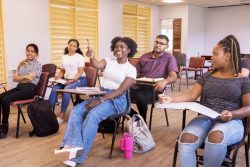Story and photos by Tifaine Rutherford
Just before one crosses the Mahaica Bridge, there is a small fishing community tucked away between the high trees and windy roads. The road leading into Mosquito Hall has quite a number of twists and turns and was once referred to as the ‘Old Road.’ Over the years, the name Mosquito Hall has been associated with one thing ‒ mosquitoes. At least, this is what residents living there said.
The name Mosquito Hall came about after a swarm of mosquitoes bit a donkey and he succumbed shortly after, several residents told Sunday Stabroek. As one resident said, “This place right fo name Mosquito Hall. Dem mosquitoes like they does wan eat people alive.”
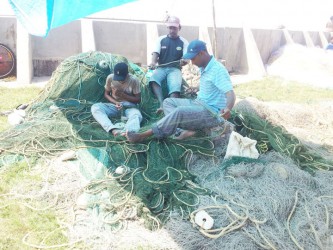
In reality it is an old plantation name, the old planters clearly suffering as much from the mosquitoes as their modern counterparts.
Mosquito Hall which is part of Unity, is some 21 miles from the capital city. It is located in Mahaica on the East Coast of Demerara. The rural community which is home to about 400 residents is notable for being the birthplace of famous West Indian cricketers Shivnarine Chanderpaul and Colin Croft, and former president of Guyana, Bharrat Jagdeo.
The inhabitants of Mosquito Hall are mainly Indian with African residents scattered throughout, residents said. It has electricity, proper roads, potable water and other amenities to make like comfortable for those living here.
A section of the village was once a coconut estate that belonged to Mr Boodhoo, Yusuff Allikhan said. He said that he has been living in the village for the past 30 years with his wife and son and that it was after he and his wife got married, that he settled here. “My wife and her family are from here and I am from West Coast; it was after me and her married that I moved here and decided to start a family.” He said that currently they were the only people living on the estate and that long ago it was a “progressive estate.”
“Long ago had a lot of people that used to live here and come and pick coconut and make copra and so on.”
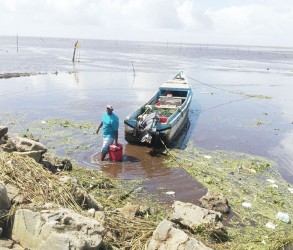
A proud farmer, he was eager to show off some of his many products which ranged from thyme to cucumbers. He said he also catches tilapia in the trench in front of his yard. “I does do a little bit of everything here so that I can have a second source of income.” He said that he has a stall in the Bourda Market where he sells his produce. Allikhan spoke about a great flood in the ’80s when the seawall broke away and the entire estate was under water. “For two to three years couldn’t plant anything here because of the salt water. I don’t get flood right now because I get good drainage.”Like many of the seamen in the village he lamented that the village is not what it used to be in terms of fish production.” At one time you used to have 135 fishing boats and now you hardly get any.”
Fishing is still the main occupa-tion of the residents, neverthe-less, although another fisherman commented that at one time the village had one of the largest fishing industries in Guyana, but now most of the fishermen have opted to go to Meadow Bank on the East Bank instead. Like several others, he complained that there needs to be a wharf because when the tide is high the boats cannot dock, and as such they are forced to turn back.
Sheff Alli who has been a fisherman in the community for the past 14 years proudly said that he loves living here and it is not hard to make a living. “You could come and catch two fish and sell and make money… If someone come here and they ain’t mek a living then they really lazy.” His normal fishing day he said, starts at 2am and ends at 2pm. “I does go out early in the morning and come back around two. I does catch all kind of fish when I go out there.”
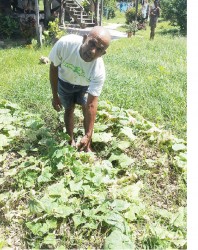
Currently, Alli, like several other fishermen are calling for the fish price to go up. “They used to give us $100 for a pound of banga and now they only giving us $70 and the price of gas going up. It ain’t making no sense…by the time we finish with all our expenses we ain’t making no sort of money,” he said.
There is a primary and secondary school in the village for the school-age children and there are also two homes in the village ‒ the Leonard Cheshire home for the disabled which provides a permanent place of residence for persons, and the Mahaica Children’s home, which will be opened later this month for child victims of abuse, teenagers who are pregnant or abandoned. For their health needs, residents go to the Mahaica Health Centre.
There is not much commercial activity in Mosquito Hall, since the larger communities nearby cater for those needs, and the main market at Mahaica is not so far away,
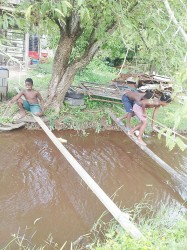
Social life in the village is very much alive as many villagers flock to the K&K gas station which has become a popular night spot on Sunday evenings. It has become traditional for people to congregate there after leaving the creek lime on the highway. Some of the residents however felt that the ‘Sunday lime’ at K&K should be curtailed, because of the noise and also because a lot of the young girls and boys in the village get into “gyal and boy problem.”
Several villagers complained about the fact that the village has one of the best cricket grounds in Guyana and no one pays attention to it. “Imagine Bourda na even bigger than this ground and yet they does spend money on that ground. We need some sort of assistance here… Imagine we asked the Minister for help and he said no.”
Fishermen in the community also made calls for the seawall to be raised. “Water always coming over the wall… this wall is too low right now. At one point the water was so high that it was overtopping. There needs to be some type of revetment work done.” Other fishermen called for a stable buyer in the area because many of them go through severe hardships.
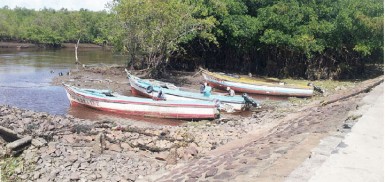
Like every other community, although the village has its highs and lows, the residents here say that it is a great place to live, but that they want more development to make it even greater.









